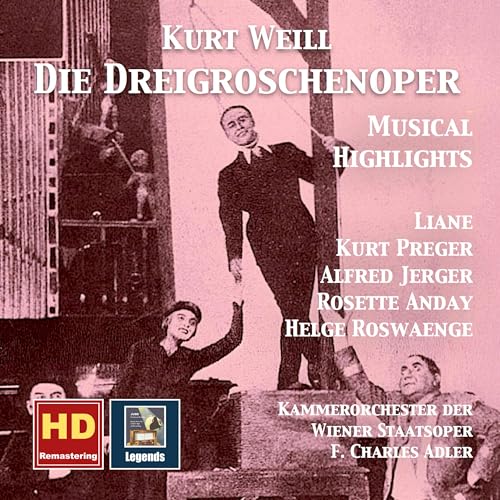
Weill: Die Dreigroschenoper – Musical Highlights (Remastered 2017)




















℗© 2017: Jube Classic
Artist bios
Helge Rosvaenge stood atop the heap of dramatic tenors in Central Europe for more than three decades. An unusual measure of vocal longevity sustained his popularity at several important venues (especially in Vienna) and lent his name a legendary aura even as his career remained an active one. With firmly concentrated lower and middle registers and a powerful, blossoming top, he was well-suited for a broad repertory from Mozart to Verdi to Strauss. While recordings of arias from Wagner's Die Meistersinger reveal an exemplary blend of thrust and lyricism, Rosvaenge wisely limited his stage appearances in this composer's works. Such caution almost certainly allowed him to maintain his voice in such remarkable order so far into his singing years.
Largely self-taught, Rosvaenge made his operatic debut in 1921 as Rodolfo at Neustrelitz, the invitation having been extended in the wake of a successful recital; appearances followed at Altenburg and Basle. Cologne engaged him from 1927 to 1930 and, beginning in 1930, he was a member at the Berlin Staatsoper. In Berlin, he was valued for his performances of the Italian repertory, surpassing his colleagues in the appropriate shaping of arias and ensembles in works by Verdi and Puccini. During this period, he also introduced himself to audiences in Munich and Vienna, quickly becoming a favorite in each house. He first appeared at the 1933 Salzburg Festival and remained there until the beginning of WWII in such varied roles as Tamino, Huon, and Florestan.
Rosvaenge ventured Parsifal at Bayreuth in 1934 and 1936 and made his debut at Covent Garden in a 1938 production of Fidelio conducted by Sir Thomas Beecham. With the Leonore of Rose Pauly and the Rocco of Ludwig Weber, Rosvaenge made a positive impression, bringing "authority and tenseness" to his performance. The Anschluss in Austria and outbreak of war the next year put a stop to further appearances.
Rosvaenge's Florestan was not his only collaboration with Beecham. He had been the conductor's choice (and that of producer Walter Legge) for a Berlin recording of Die Zauberflöte the preceding year. That his stentorian tenor was regarded by two such particular individuals as an exemplary fit for the lyric role of Tamino says much about the tenor's adaptability. Together with Tiana Lemnitz, Erna Berger, and Gerhard Hüsch, Rosvaenge was part of a recording project that was regarded from the outset as historic.
During WWII, Rosvaenge often sang for the Axis powers and found at war's end that his enthusiastic participation had caused considerable political problems. When he was finally cleared by the Allies, however, he actively resumed his career. He remained with the Vienna Staatsoper as an active member until 1958. His only American appearances were in recital. In his New York programs, sung when he was past his mid-sixties, he amazed audiences with the extraordinary power he could still summon and his clarion top register.
Rosvaenge recorded extensively: arias, longer excerpts from opera, occasional lighter works (he was notably successful in operetta), and lieder. In addition to his Tamino, his Bacchus in the 1935 Berlin recording of Ariadne auf Naxos with Viorica Ursuleac (opera only, not the prologue) set a standard not equaled since. The unwavering steadiness and heroic impact of his high range predestined him for Strauss' awkwardly written tenor protagonists.
Customer reviews
How are ratings calculated?

